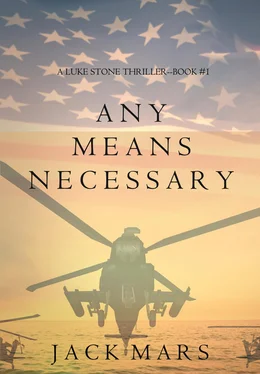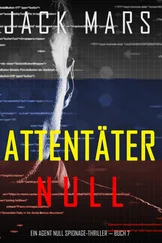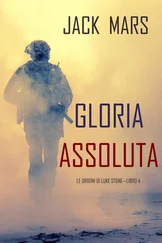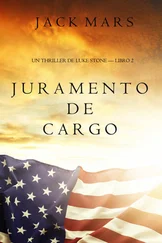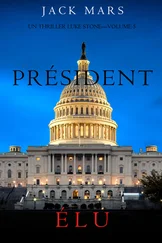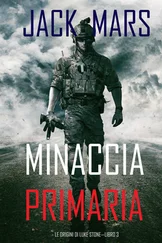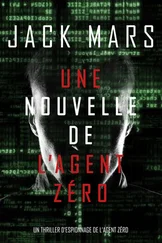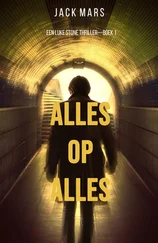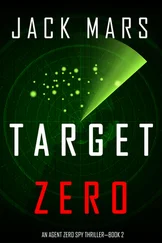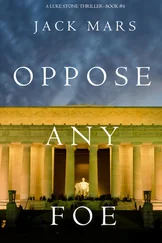“I’m here, all right.”
“Continue to stay on the floor, please. Do not stand up for any reason, okay?”
“Okay.”
Chuck took a deep breath then stood up. His knees popped. His hands moved along the wall until they found the glass case. He had no idea how to open it, so he punched it as hard as he could. It was breakaway glass, and it shattered instantly.
The case was deep. His hands roamed inside of it, feeling familiar shapes. There were ventilator masks in here. He would need those. There was a gun – unnecessary, given the circumstances. He found a flashlight secured to the wall with a strap. He undid the snap, brought the flashlight out, and turned it on. It worked.
Oh my God. Light.
Quickly now he found water and a stack of meals-ready-to-eat. A first aid kit. A hatchet and a universal tool. He dropped to the floor just before his breath ran out.
He leaned against the wall. They were alive, and they had supplies. They were moving forward, and it was time to start thinking ahead. The facility had been attacked. It was a hardened facility, so it should withstand any missile or bomb attack from above. That suggested the attack had come from down here. And that, in turn, suggested that Chuck needed to find a way to the surface.
But…
He had to be careful. Nearly a decade ago, when he had first gone in the field, they had paired him an older agent, a man named Walt Brenna, who was months from retirement. Walt had a funny way about him. The other agents said he was a curmudgeon. They told Chuck not to listen to him. But he and Walt spent a lot of time together. Some days, there was nothing to do but listen to him.
Walt was obsessed with a concept he called “White on White.”
“They’ll tell you that this job is watching out for Islamic terrorists or Russian assassins or what have you,” Walt would say. “But it really isn’t. You think those guys are going to get anywhere near the President of the United States? Think again. The entire point of what we do is to neutralize a White on White attack.”
Chuck Berg took Walt’s ramblings with a giant grain of salt. But they stuck with him over the years, and he sometimes thought about them. To Walt Brenna, a White on White attack was one where the government attacked itself. The Kennedy assassinations were examples of this. So was the attempted assassination of Ronald Reagan in 1981.
Walt Brenna on Reagan:
“The Vice President, first in the line of succession, is the former CIA Director. The father of the man who tries to kill the President is the head of World Vision, a CIA front group. The Vice President’s family are friends with the would-be assassin’s family. The Vice President’s brother and the assassin’s brother are scheduled to have lunch together while the murder is taking place. Very little of this makes the newspapers. None of it is ever investigated. Why? Because the assassin is crazy and that’s all we need to know? No. Because White on White is an accepted part of the game. Their job is to do it, and our job is to stop it. Offense and defense, that’s all.”
As the years passed, Chuck learned that Walt wasn’t the only one in the Service who thought this way. No one talked openly about it, but he had heard whisperings. How could you identify a White on White? What would it look like if one was coming?
Chuck nodded to himself. This is what it would look like. A bomb had gone off inside a secure facility, hours after an attack on the White House. The explosions at the White House also came from inside the building, or most of them did. Outsiders couldn’t plant bombs in either place, and definitely not in both places. The only ones who could have done this were the military, the intelligence community, or the Secret Service itself.
With the benefit of the flashlight, he crouched low and duck-walked quickly back to the Vice President. She hadn’t moved at all.
“Ma’am? You can sit up now, if you can manage it. I have food, water, and a first aid kit. We’re going to need to wear these masks when we move out, and I’ll show you how. It will seem cumbersome and confining at first, but I promise you’ll get used to it.”
She moved slowly to a sitting position. She winced at the pain in her arm. Some of the skin on her face had peeled away. To Berg, the burns looked superficial, although she might get some scarring or discoloration. If that was the worst thing that happened to her, Chuck would call that lucky.
“Shouldn’t we try to call someone?” she said.
He shook his head. “No. We can’t call anyone. We don’t know who the enemy is. For the time being, we’re going to operate in secret.”
She seemed to think about that. “Okay.”
“Now, the way to the surface may be difficult,” Chuck said. “We might have to climb, and it may be frightening, and painful. So I’m going to ask you to do something for me. I’m going to ask you to reach down deep inside, and be as tough as you can. Find that tough person inside you. I know she’s in there. Can you find her?”
The woman looked at him, and suddenly her eyes were hard. “Buddy, I was in the fashion industry, surrounded by predators, when I was a young girl. I was living in New York and Paris and Milan, by myself, at sixteen years old. I am as tough as they come.”
Chuck nodded. That was exactly what he wanted to hear.
11:57 p.m.
The United States Naval Academy – Annapolis, Maryland
It was a strange place to meet.
Luke was dressed entirely in black. He wore black gloves. There was a black hood stuffed in his pocket.
The dark football field of the Navy Marine Corps Memorial Stadium spread out in front of him. The vast empty stands towered above him. GO NAVY was painted in massive letters across the upper tier of seats. In the night, the words looked white, but he knew that in the daytime they were yellow against a dark blue background.
He hung back, lingering in the shadows of the end zone concourse ramp. He watched the darkened broadcast booth at the top of the stadium, looking for the slightest movement. If he were a sniper, that was where he would be.
A man walked across the field toward him. Gradually, the man became clearer. He was tall, heavyset, walking as though he was carrying more weight than he once had. He wore a long overcoat. He came closer still, and now Luke could make out the dark suit under the man’s coat, and the soft, almost doughy features of the man’s face.
He entered the darkness of the concourse ramp.
Luke moved, only slightly. “Mr. Secretary?”
The man started, just a touch. It was clear he hadn’t seen Luke there. His eye was drawn immediately to the black matte Glock in Luke’s hand. Luke holstered it for the moment, to put the man at ease.
“Yes,” the man said. “I’m Dave Delliger.”
“I’m Luke Stone.”
“I know who you are. I was on a call with the President today. You’re the man who saved his life.”
“Temporarily,” Luke said.
“Yes.”
“I’m sorry things happened this way.”
Delliger nodded. “I am, too.”
“I hate to ask you this, sir, but is there any chance you were followed here?”
Delliger nodded again. “There’s every chance. I attended the new President’s swearing in two hours ago at Site R. I took a Navy helicopter here. Site R is a hundred miles away, in the mountains. In the dark, with my failing night vision, it would have taken me until tomorrow morning to get here.”
Luke faded back against the wall. That was the wrong answer. Certainly not the one he was hoping for.
“Don’t worry,” Delliger said. “There’s nothing out of the ordinary. They have no reason to suspect me. This is my alma mater, and I taught here for many years. I still keep an office and a bedroom on campus. The Navy lets me do it because they’re so proud of me. I am what you might call a fixture here. I told the people at Site R that if we’re all going to die, I would prefer to do it here than in a hole in the ground.”
Читать дальше
Конец ознакомительного отрывка
Купить книгу
